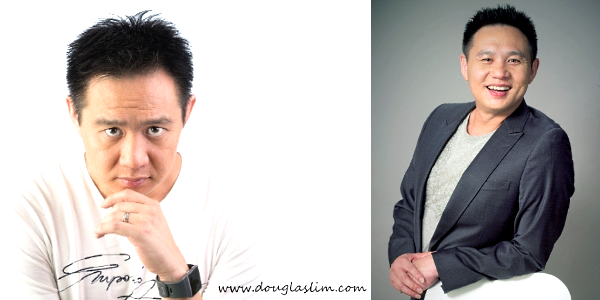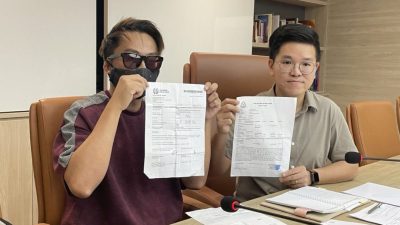
Born with a humor gene, Douglas Lim is a very down-to-earth man when he talks, as he inspects day-to-day issues from different perspectives. Even a very trivial matter could be a big deal when he speaks into the microphone, making people laugh out loud.
Stand-up comedy sinks into the coldest winters owing to the coronavirus pandemic, forcing Douglas Lim to stop putting up a show. But that does not stop him from bringing laughter to the masses.
He has taken his offline stage shows to the cyberspace, sharing his gift of entertaining the crowd on the social media and bringing an additional dose of cheers to the dismay in the midst of such trying times.
Douglas is multitasking and multitalented. He is an actor, scriptwriter, lyric writer, composer, anchor, content creator as well as a stand-up comedian, showing off his multilingual talent in TV dramas, especially for his unforgettable role as Steven in the 1990s local English-language sitcom "Kopitiam", as well as "Homecoming" and the 2019 production "Spanar Jaya X".
As a stand-up comedian, one not only needs to have the gift of the gab, but also speaks at the right time in tandem with the mood and tempo on the floor.
The biggest setback of taking the show online is the inability to visually gauge the audience's instant reactions and the absence of the excitement of being able to improvise in response to the audiences' reactions and tastes.
If he were to put up a show on Zoom, he would suggest to his viewerss to turn on the video-recording function so that he can at least see everyone laugh out loud.
"While it's weird to see me perform online, it's weirder to do so without an audience. I'm like talking to myself in front of the camera!"

Sense of humor needed
Douglas has so far posted a number of short videos each lasting one to three minutes.
"I wasn't active on social media in the past, more on print media, TV or radio. You can call me the "old school" type of guy but somehow that's how I spent most of my time."
Douglas speaks Cantonese but not Mandarin. As such, he mostly speaks English and Malay in front of his audience.
He admitted that putting up a Malay stand-up comedy show could be a lot tougher even though the scope of Malay humor is much broader. On the contrary, in English humor, many words could lead to misunderstanding and their use should therefore be more discreetly planned.
Sure enough a stand-up comedian needs to have an acute sense of humor and observation. Anything happening around us could make an interesting topic.
"You must have the intuition. When we see something, we should tell instantly that something is not quite right or logical. For example, when the government said you should not visit relatives or host open houses during CNY but could go to a pasar malam, people will start grumbling that the government has not been thoughtful enough.
"A comedian or anyone with a keen sense of humor should immediately seize such an opportunity to conceive how to create a joke out of the incident.
"If I were to make a video. I would open my house to guests who would dress up as peddlers., and when the police come up, I would tell him we are not gathering. It's pasar malam here!"
What happens when you run out of ideas?
"I normally would watch some comedies, shows by stand-up comedians overseas on YouTube. Some TikTok short videos are really good! These things will make me feel good and slowly the energy and inspiration will come back."

The Godfather
Since young Douglas has been an avid attention seeker. He loved singing, acting, cracking jokes and mimicking comic characters. His father was a military helicopter pilot and the family once lived in an air base.
Back then many of the kids there followed their fathers' footsteps to become soldiers or pilots, but Douglas just wanted to join a circus to become a clown to make people laugh.
"There were more options opening up to me as I grew up. Slowly I turned my focus to becoming an actor, singer, lawyer or something like that."
After Form 5, Douglas started his stage shows and later joined TV, and finally became a TV anchor and stand-up comedian.
He majored in Teaching of English as a Second Language (TESL), and in 2000, he furthered his studies in Canterbury, UK. However, he did not become a teacher but went into the show business instead upon his return to Malaysia.
It took him a lot of courage to be a performing artist, especially in local TV dramas, as the remunerations were not very lucrative.
Most of the artists are freelancers who need to have another more stable job to support their acting dreams.
Back then Douglas became an MC at corporate dinners and events and this helped increase his exposure and training in on-the-spot reactions.
"The MC job paid quite well at that time, equivalent to what three or four sitcom episodes would pay."
Douglas has always had a strong passion for stand-up comedy. He watched Harith Iskander, Jit Murad and Instant Cafe Theatre, and found them really funny.
"I told myself I had to do like that. It's a great joy seeing these people perform."
By the time he was taking up a role in "Kopitiam", he was already a comedian. Even in "Homecoming", he was more of a comic character.
Douglas was having a tough time at the start of his journey, as he learned to avoid the pits only after falling into them multiple times.
Can a stand-up comedian perform in a house party? There was once he was given an assignment at a house party, with guests arriving at six and starting to drink until ten, when he was supposed to start his show.
"This doesn't make sense! Everyone was half drunk by then and no one was in the mood to listen to your joke!"
The organizer later refused to pay him, arguing that he had not done his job properly.
After some self assessment, Douglas indeed found himself not good enough to take the pay.
"That was actually not the first time, but many times already."
Several years ago, he attended an event and many of the guests were already quite drunk. Moreover, most of them were not well versed in English and after performing for around five minutes to an unresponsive audience, he quietly stepped down from the stage and returned the check to the organizer.
"It was just a job assignment. If I didn't do well enough, I felt we could always work together again another time."
In 2007, he met Malaysia's godfather of stand-up comedy Harith Iskander.
"We have the same manager. He asked me whether I wanted to put up an opening show for Harith, say for the first seven minutes. If I didn't do well, never mind, as Harith could bring up the mood later. If I did well, I would leave an impression in the audience, and it would be an excellent training for me!"
Douglas observed how Harith managed the audience's attention. He remembers there was this time he was performing in front of a largely Chinese-speaking crowd but he was speaking in English on the stage. Some understood him but most did not. When he went down to the stage, he told Harith softly, "Harith, very Chinese lah!"
Harith modified his strategy on the stage, uttering a whole lot of clumsy Chinese words that immediately drew the audience's attention to him.
"I learned a lot from Harith. The audience won't care how funny your joke is. If they don't understand English, then don't use a deep vocabulary."

Comedy clubs
A stand-up comedian not only needs to prepare his own script but also to put it to test. They will normally go to a comedy club "open mic" to gauge the audience's response and from there modify the script.
"It is typically a place newcomers in this line practices. Overseas, people pay about US$10 to $20 to see the show. Professional stand-up comedians will go there to test their jokes. If you're lucky, you might chance upon Chris Rock performing on stage!"
Local stand-up comedians such as Jason Leong, Phoon Chi Ho, Rizal Van Geyzel, Kavin Jayaram and Papi Zak have all visited local comedy clubs such as Crackhouse and the Joke Factory to test their jokes.
"I don't know whether I was lucky or not. When I first started doing stand-up, there was no open mics here, so I had to be very careful to gauge myself whether my joke was good enough for the stage show.
"I seldom do impromptu."
Douglas admitted that he was not a quick-witted type of person and couldn't come out with really funny jokes on the spot.
"If there is no need for an impromptu show, why put yourself in a dilemma?
"If you have two weeks to prepare, write down the script properly and keep practicing. I would never choose to do a 'rock and roll' on the day itself."
Stand-up comedy is not just a form of performing art, but also a way of psychological healing.
A performer will try to explore all the setbacks, frustrations and pains in day-to-day life by way of self ridicule and comedy, and then laugh it out to vent chronically accumulated frustration.
"After watching the videos, many just commented 'Hahaha'. They seem to enjoy themselves so much. Some might write that they feel so pressurized today but a whole lot better after watching my videos.
"While such comments might not be anything, I feel really great being able to help people solve their problems.
"I'm really grateful they tell me their feelings and views."
Douglas Lim's videos:
ADVERTISEMENT
ADVERTISEMENT


































